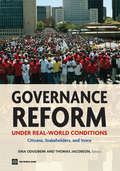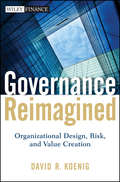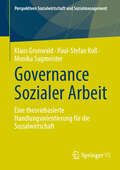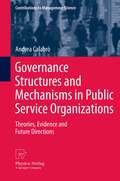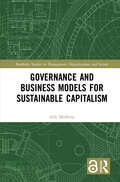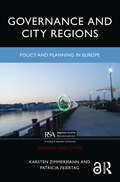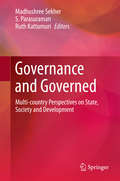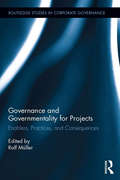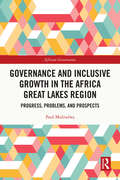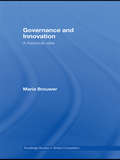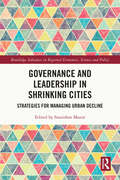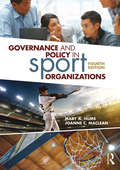- Table View
- List View
Governance Networks in the Public Sector
by Erik Hans Klijn Joop Koppenjan Wouter Spekkink Rianne WarsenGovernance Networks in the Public Sector presents a comprehensive study of governance networks and the management of complexities in network settings. Public, private, and non-profit organisations are increasingly faced with complex, wicked problems when making decisions, developing policies, or delivering services in the public sector. These activities take place in networks of interdependent actors guided by diverging and sometimes conflicting perceptions and strategies. As a result, these networks are dominated by cognitive, strategic, and institutional complexities. Dealing with these complexities requires sophisticated forms of coordination: network management.This book provides a conceptual framework and analytical tools to study the complexities involved in handling wicked problems in governance networks in the public sector. The book also discusses strategies and management recommendations for government, business, and third sector organisations operating in and governing networks. This second edition of the book is a truly revised edition, incorporating recent developments in network governance theory and practice, such as the influences of traditional and social media on network governance processes.This volume is an essential text for advanced students of public management, public administration, public policy, and political science, and for public managers and policymakers.The Open Access version of this book, available at http://www.taylorfrancis.com, has been made available under a Creative Commons Attribution-Non Commercial-No Derivatives (CC BY-NC-ND) 4.0 license.
Governance Practices at Financial Regulatory and Supervisory Agencies
by Alicia Novoa Steven SeeligA report from the International Monetary Fund.
Governance Reform Under Real-World Conditions: Citizens, Stakeholders, and Voice
by Sina Odugbemi Thomas JacobsonAlthough necessary and often first rate, technocratic solutions alone have been ineffective in delivering real change or lasting results in governance reforms. This is primarily because reform programs are delivered no in controlled environments, but under complex, diverse, sociopolitical and economic conditions. Real-world conditions. In political societies, ownership of reform programs by the entire country cannot be assumed, public opinion will not necessarily be benign, and coalitions of support may be scare or nonexistent, even when intended reforms really will benefit those who need them most. While the development community has the technical tools to address governance challenges, experience shows that technical solutions are often insufficient. Difficulties arise when attempts are made to apply what are often excellent technical solutions. Human beings--either acting alone or in groups small and large--are not as amenable as are pure numbers, and they cannot be ignored. In the real world, reforms will not succeed, and they will certainly not be sustained, without the correct alignment of citizens, stakeholders, and voice. 'Governance Reform under Real-World Conditions: Citizens, Stakeholders, and Voice' is a contribution to efforts to improve governance systems around the world, particularly in developing countries. The contributors, who are academics and development practitioners, provide a range of theoretical frameworks and innovative approaches and techniques for dealing with the most important nontechnical or adaptive challenges that impede the success and sustainability of reform efforts. The editors and contributors hope that this book will be a useful guider for governments, think tanks, civil society organizations, and development agencies working to improve the ways in which governance reforms are implemented around the world.
Governance Reform in Africa: International and Domestic Pressures and Counter-Pressures (Routledge Explorations in Development Studies)
by Jerome BachelardPoor governance is increasingly recognized as the greatest impediment to economic development in Sub-Saharan Africa. Currently, some impressive governance reforms are underway in many countries. This includes cases such as Nigeria – formerly the most corrupt country in the world according to Transparency International. Yet other countries such as Chad are still in reform deadlock. To account for these differences, this book examines governance reform in Sub-Saharan Africa based on an analysis of international and domestic pressures and counter-pressures. It develops a four phase model explaining why governance reforms advance in some instances, whilst in others governance reforms stagnate or even relapse. No study has sought to systematically examine the political forces, both international and domestic, behind the successful conduct of governance reform in Sub-Saharan Africa. Yet, coordination, collaboration and mutual support between international and domestic actors is critical to push individual governments onto the path of reform. This book shows that while international and domestic pro-reform pressures are important, an analysis of anti-reform pressures is also necessary to explain incomplete or failed reform. The main theoretical arguments are structured around four hypotheses. The hypotheses are theoretically generated and tested over four case studies – Madagascar, Kenya, Nigeria and Chad. On this basis, the good governance socialization process is inductively developed in the concluding chapter. This model illustrates how governance practices can evolve positively and negatively in all countries of Sub-Saharan Africa, based on the nature and relative strength of international and domestic pressures and counter-pressures.
Governance Reimagined
by David R. KoenigA timely guide for companies needing to grow equity and human capital after the recent economic turmoil. Written for leaders and students of for-profit, non-profit, political, and social organizations who are looking for a way to do their work more effectively. Most organizational leaders only partially understand the factors that affect the amount of value created by the activities of their organization and thus greatly under-deliver on the potential to achieve their objectives and serve their target audiences. Governance Reimagined has been written to fill in the missing pieces of this puzzle. It will help put your organization on the path toward re-governing, or redesigning how it works, to unlock its hidden value. Page by page, it will show you how to generate new and better processes and improve the value of those processes by altering the external perception of their risk. Addresses various issues that affect corporate value, from management and systems theory to governance science, risk management, and traditional finance Reveals how to recognize internal processes and external events that affect value creation Highlights how to create resilient organizations that generate greater value from their processes Governance Reimagined offers corporate leaders a new way to think about value, and will help you understand some of the factors that destroy value within organizations, but most importantly how new value can be created and how missions can more ably be fulfilled. This is an important book for these dynamic economic times.
Governance Sozialer Arbeit: Eine theoriebasierte Handlungsorientierung für die Sozialwirtschaft (Perspektiven Sozialwirtschaft und Sozialmanagement)
by Klaus Grunwald Monika Sagmeister Paul-Stefan RoßDer vorliegende Band widmet sich der Steuerung von sozialwirtschaftlichen Organisationen und von Unterstützungsarrangements der Sozialen Arbeit. Der Governance-Ansatz wird genutzt, um auf zentrale Steuerungsfragen Sozialer Arbeit konzeptionelle Antworten zu finden, die vor dem Hintergrund der gegenwärtigen gesellschaftlichen Transformationsprozesse tragfähig sind. Dazu greift er auf die Diskurse zu Welfaremix, Netzwerken sowie Organisationen und ihrer Steuerung zurück. Ziel ist eine theoretisch-konzeptionelle Fundierung der Handlungspraxis von (potenziellen) Führungskräften in der Sozialen Arbeit.
Governance Structures and Mechanisms in Public Service Organizations: Theories, Evidence and Future Directions
by Andrea CalabròThis book addresses the nexus of issues exploring governance structures and mechanisms in public service organizations, thus contributing to the development of disciplines that focus on public management. It goes beyond the state of the art by addressing a number of specific issues in a more systematic fashion. The book's interdisciplinary focus is a particularly valuable asset, as its topic is situated at the crossroads of a number of fields, including public management, business administration, corporate governance, policy studies, political science, sociology, and third sector studies, all of which offer important perspectives and are important for the development of public management and public services. The book covers more than Italy and Norway and focuses specifically on public service organizations, addressing more aspects of their governance structures and mechanisms than any other book available today. The unique presentation of features related to the governance and management of different actors (state-owned enterprises, local public utilities, ministries, municipalities, citizens, etc.), involved at different levels in the production and provision of public services, makes it possible to compare and contrast these different perspectives and opens new avenues of theoretical collaboration and development.
Governance Transition at Anadolu Group
by Paul M. Healy Esel CekinKamil Yazici and Izzet Ozilhan founded and built Anadolu Group Holding; a family business that grew into a multi-billion-dollar regional powerhouse. For 57 years they were equal partners in running the company. They then handed over a leadership role to a next generation family member; Izzet's son Tuncay; who became the CEO and later also chairman. Under Tuncay's leadership; the company was primarily run by professional managers; supplemented by a limited number of second- and third-generation family members in senior executive positions. However; in 2017; when the number of next-generation family members reached 85; Kamil and Tuncay began work on a governance structure they hoped would sustain the company when they left. Under their plan; family members would no longer be allowed to hold general management positions. As a result; Tuncay retired as CEO and other family members with senior executive roles resigned. A holding company was created to bring all the company's subsidiaries under a common structure. And a process was created to allow some members of the two surviving families to hold board seats. Although the stock market reacted positively to the increased transparency brought about by the changes; it remains to be seen whether the new formula will achieve its goal of successfully transitioning the company from a family-managed business to professionally-run company.
Governance and Business Models for Sustainable Capitalism (Routledge Studies in Management, Organizations and Society)
by Atle MidttunGovernance and Business Models for Sustainable Capitalism touches upon many of the central themes of today’s debate on business and society. In particular, it brings attention to a recurrent tension between efficiency, innovation, and productivity on the one hand, and fairness, equity, and sustainability on the other. The book argues that we need radical rethinking of business models and economic governance, beyond the classical doctrine, which sees social and ecological responsibility as lying with public-policy regulation of purely profit-seeking firms. In spite of the popular CSR agenda, business – as we know it today – is both too transient and too limited in its motivation to carry the regulatory burden. We need to adopt a much wider concept of 'partnered governance', where advanced states and pioneering companies work together to raise the social and environmental bar. The book suggests that civil engagements based on moral rather than formal rights, and amplified through the media, may provide a healthy challenge both to autocratic planning and to solely profit-centered commercialization. The book also proposes a triple cycle theory of innovation for sustainability: a novel framing of the efficacy of green and prosocial entrepreneurship as intertwined with political visions and supportive institutions. In addition, the book offers reflections on the ways in which further digital robotizaton may enable transition to an ‘Agora Economy’ where productive efficiency is combined with expanded civic freedoms. Aimed primarily at researchers, academics, and students in the fields of political economy, business and society, corporate governance, business ethics, corporate social responsibility, and sustainability, the book will additionally be of value to practitioners, supplying them with information regarding the challenges associated with the shaping of sustainable or ‘civilised’ market capitalism for a better world.
Governance and City Regions: Policy and Planning in Europe (Regions and Cities)
by Karsten Zimmermann Patricia FeiertagCity-regions are areas where the daily journeys for work, shopping and leisure frequently cross administrative boundaries. They are seen as engines of the national economy, but are also facing congestion and disparities. Thus, all over the world, governments attempt to increase problem-solving capacities in city-regions by institutional reform and a shift of functions. This book analyses the recent reforms and changes in the governance of city-regions in France, Germany and Italy. It covers themes such as the impact of austerity measures, territorial development, planning and state modernisation. The authors provide a systematic cross-country perspective on two levels, between six city-regions and between the national policy frameworks in these three countries. They use a solid comparative framework, which refers to the four dimensions functions, institutions and governance, ideas and space. They describe the course of the reforms, the motivations and the results, and consequently, they question the widespread metropolitan fever or resurgence of city-regions and provide a better understanding of recent changes in city-regional governance in Europe. The primary readership will be researchers and master students in planning, urban studies, urban geography, political science and governance studies, especially those interested in metropolitan regions and / or decentralisation. Due to the uniqueness of the work, the book will be of particular interest to scholars working on the comparative European dimension of territorial governance and planning.
Governance and Control of Data and Digital Economy in the European Single Market: Legal Framework for New Digital Assets, Identities and Data Spaces (Law, Governance and Technology Series #71)
by Carmen Pastor SempereIn an era where the digital realm is evolving at an unprecedented pace, the legal framework must adapt accordingly to ensure effective governance and control. This open access book explores the intricate web of regulations governing new digital assets, identities, and data spaces within the European Single Market. Through a comprehensive exploration of emerging concepts, it provides clarity amidst complexity and empowers stakeholders to navigate the evolving digital landscape with confidence, making it essential reading for legal professionals, policymakers, regulators, academics, and industry practitioners. The book explains the need for legal adaptations to incorporate new technologies in the European Union, focusing on regulating Distributed-Ledger Technologies (DLT/Blockchain) and crypto-assets through the MiCA Regulation. It discusses the challenges and opportunities involved in ensuring stability and user protection and investigates the regulatory frameworks for Asset-Referenced Tokens, E-money Tokens, Utility Tokens, and Non-Fungible Tokens (NFTs). It also addresses related topics such as artificial intelligence, digital identities, data spaces, and cyber-security, providing an analysis rooted in European law that points to the European Roadmap to the Digital Decade for 2030. It deals with the European Digital Identity in the eIDAS2 Regulation and the Artificial Intelligence Act, both adopted in 2024, providing a lege ferenda perspective. Additionally, the book examines Open Data and Open Finance, emphasizing their roles in promoting competition and innovation while addressing data privacy and security concerns. It covers the implications and challenges of Digital Money and Digital Payments, particularly in the context of the Digital Euro project, the impact on monetary policy and financial inclusion, and the European Digital Identity — the EU Digital Identity Wallet, EUDI — enabling mutual recognition of electronic identification systems across EU countries.
Governance and Fund Management in the Chinese Pension System
by Gregorio Impavido Yu-Wei Hu Xiaohong LiA report from the International Monetary Fund.
Governance and Governed
by S. Parasuraman Madhushree Sekher Ruth KattumuriBuilding, largely, on insights from India, and case studies in Brazil, China, and South Africa, this book provides insights into the contested topic of 'governance and governed' from a state-society inter-relationship perspective. It argues that the centrality of an understanding of state-governance today is rooted in concerns regarding diversities and contingencies of concrete political reality to address inequalities, exclusion and vulnerabilities. These countries are part of the BRICSs consortium, and have been recognised for their growth potential in the world economy. But their economic progress alone may not necessarily translate into a better quality of life. The approach here is not to focus on a particular understanding of governance, but to utilise a wider lens to understand the nature and extent of incremental processes in the different case-study contexts in order to offer a broader framework for procedural and substantive understanding of governance, rather than a prescription of a government and its activity of governing. The focus is on deriving practical lessons about governance process that are of interest to the wider development community.
Governance and Governmentality for Projects: Enablers, Practices, and Consequences (Routledge Studies in Corporate Governance)
by Ralf MullerThis research-based book takes an organization-wide perspective to describe the governance and governmentality for projects in organizations. Governance of projects defines and directs the ways managers of projects, programs, and project portfolios carry out their work. Governmentality is the way the managers of these managers present themselves to those they lead.Governance and Governmentality for Projects starts with introducing existing theories, models and paradigms for governance and governmentality. It then develops a chronological framework of the ways governance and governmentality for projects is enabled in organizations, how it subsequently unfolds in organizations of different types and sectors, and the consequences of different governance approaches for project results, trust, control, and ethical issues in projects. Special emphasis is given to the link between corporate governance and the governance of project, programs and project portfolios. Three real-life case studies exemplify the research findings described in the book. Through its structure this book describes the development of governance and governmentality in the realm of projects from its organizational origins, via observable practices, to expected consequences of different implementations. Aimed at academics, post-graduate students in business and management, reflective practitioners, standards or policy developers, those in governance roles and others in need of a detailed knowledge of the spectrum of project related governance in organizations, this book will help develop a comprehensive understanding of the theoretical and practical underpinnings of the subject, their interaction, and implications for implementation. This allows for understanding and developing of both generic and idiosyncratic governance structures, such as those needed in project-based organizations.
Governance and Inclusive Growth in the Africa Great Lakes Region: Progress, Problems, and Prospects (African Governance)
by Paul MulindwaThis book provides a comprehensive analysis of the development and governance nexus in Africa’s Great Lakes region. The Great Lakes region continues to experience many challenges, yet much of the literature continues to focus on political governance, leaving behind the socio-economic aspects of the everyday lives of people in the region. This book seeks to bridge this gap in information, considering the social, economic, and cultural dynamics of the population as they inter-play with political discourse as key factors of sustainable development. Drawing on empirical cases and examples from Burundi, Kenya, Rwanda, South Sudan, and Uganda, the book analyses each of the major governance and development issues in Great Lakes region of Africa, including region building and integration, social protection, inter-state relations, democracy and participation, and sustainability. Written by an African scholar with over 20 years of experience of working with indigenous groups in over 34 African countries, this book will be an important read for students and scholars across the fields of international relations, political studies, sustainable development (social and economic), sociology, public policy and management and public administration.
Governance and Innovation: A historical view (Routledge Studies In Global Competition Ser.)
by Maria Brouwer"This provocative book applies law and finance theory to a wide range of issues bearing on corporate governance and business history. Brouwer's analysis should hold particular interest for students and scholars interested in comparative governance."Joseph A. McCahery, Professor of Corporate Governance and Innovation, University of Amsterdam Center
Governance and Internal Controls for Cutting Edge IT
by Karen F. WorstellTo remain competitive we rely on being early adopters of new technologies - but there are inherent risks. As we implement these technologies, how do we manage the risks without hindering the progress of the business? In Governance and Internal Controls for Cutting Edge IT, Karen Worstell explains strategies and techniques to guide IT managers as they implement cutting edge solutions for their business needs. Based on practical experience and real-life models, she covers key principles and processes for the introduction of new technologies and examines how to establish an appropriate standard of security and control, particularly in the context of the COBIT 5® framework and affiliated standards. This book will enable you to apply security and control methods that are suitable for your business, ensure that you make the most of the potential benefits, and are aware of the potential risks of your IT provision. It will show you how the application of appropriate standards can improve stakeholder relationships and enhance your service management and delivery, enabling you to maximize the opportunities that are presented by compliance legislation and regulations. You will learn how to manage your data storage, recovery and migration - particularly in the context of the Cloud, ensure business continuity in the face of an incident, and implement strategies to cover the risk of business interruption.
Governance and Leadership in Health and Safety: A Guide for Board Members and Executive Management
by Waddah S. Ghanem Al Hashmi Bob ArnoldThis book is a leadership guide to the effective implementation of the ISO 45001:2018 standard. It takes the high-level leadership and top management principles put forward in ISO 45001 and develops them into a comprehensive discourse on how, at the very top of any organization, large or small, leaders can drive the occupational health and safety (OH&S) agenda and ensure the effective implementation of the OH&S management systems. While the standard sets out expectations for top management, this book provides a clear explanation of the OH&S roles, responsibilities, and accountabilities between those who direct the organization and drive it towards achieving its strategic aims and those who lead the day-to-day operations. It puts forward a purposeful, easy-to-follow, and effective system for the implementation of ISO 45001 whilst also, and more importantly, maximizing the value proposition of such a global standard, regardless of industry. The book is written for top management teams of both non-executive and executive leadership, as well as senior advisors, in all organizations seeking to effectively implement OH&S policies and management systems. It can also be utilized to create training and learning materials to assist with implementation.
Governance and Leadership in Shrinking Cities: Strategies for Managing Urban Decline (Routledge Advances in Regional Economics, Science and Policy)
by Stanisław MazurThe aim of this publication is to look in depth at depopulation - a trend that is affecting an increasing number of cities worldwide. It has recently become a critical issue with a range of detrimental social, economic, spatial, and financial consequences. However, attempts by central and local governments to combat depopulation have yet to yield satisfactory results. Compelling evidence suggests that one of the reasons for this state of affairs is that the role of local (urban) leadership in devising solutions, mobilizing resources, and creating networks to address the problem has been underestimated. Moreover, according to the authors of this monograph, there is a significant positive correlation between urban leadership and the ability to effectively respond to and counteract the negative effects of depopulation. Without an understanding of the impact of urban leadership on the ability to address the negative consequences of urban depopulation, it is impossible to pursue effective public policies in this regard. This book presents a novel approach to explaining the ability of cities to combat depopulation through the prism of urban leadership quality. It compares domestic empirical research findings with international case studies, and offers a comprehensive review of valuable practices to counter urban shrinkage and depopulation, from both academic and practical perspectives. Further, the book provides a new interpretation of the processes associated with these trends. The magnitude of the phenomenon in question, the negative spatial, economic, and social consequences, as well as the relatively low effectiveness of policies aimed at its mitigation, will make this book an invaluable guide for researchers, and students from a wide range of disciplines including urban studies, economics, public management, leadership studies, local government, climate change and energy transition and urban movements. The audience will also comprise of policymakers and urban experts such as sociologists, planners, social geographers, economists, and architects.
Governance and Management of Sustainable Innovation: Learning from Experience to Shape the Future (Sustainability and Innovation)
by Mattia Martini Rick Hölsgens Rafael PopperSustainable innovation (SI) is considered to be a key driver of societal progress in an era of enormous economic, environmental and societal challenges, and the uncertainties and future consequences that come with them. This book provides evidence, insights and reflections related to specific issues of governance, the management of sustainable innovation and applying a multi-level, multi-stakeholder approach to sustainable innovation analysis. Building on the European Commission (EU) funded research project “Public Participation in Developing a Common Framework for the Assessment and Management of Sustainable innovation” (CASI), it presents tools for assessing and managing sustainable innovation, and reflects on SI-related policies as well as citizens’ aspirations. The book is intended for scholars in the field of sustainable innovation, as well as to policymakers, innovators, students and citizens.
Governance and Performance Management in Public Universities: Current Research and Practice (SIDREA Series in Accounting and Business Administration)
by Eugenio Caperchione Carmine BianchiThis edited volume contributes to the ongoing research and practice on applying performance management to university governance. A comparative approach and international perspective of the issue is provided through extensive use of case studies and empirical findings. A specific focus is also placed on using performance governance applied to higher education institutions' Third Mission, and on enhancing decision makers’ ability to frame dynamic complexity. In this regard, specific attention is devoted to analyzing the cause-and-effect relationships in affecting public outcomes. This also includes managing trade-offs in both time and space, and detecting and counteracting unintended behavioral effects from the use of formal systems focused on quantitative measures for performance assessment.
Governance and Performance in the German Public Research Sector
by Dorothea JansenToday, higher education and research institutions are confronted with variable and sometimes contradictory demands from state, industry and society. They have to face growing volatility in education policy, and a research paradigm that sees an accelerating rate of knowledge growth as well as the internationalization of the knowledge process itself. It is vital that academics and policymakers stay abreast of the impact that policy changes have on education and research in tertiary institutions. Based on a sector-specific theory model for the governance of research organizations, this book outlines evidence of the effects of the so-called 'new public management reforms' in the German university and public research sector. The volume aims to shed some light on the differences between the disciplines in input, throughput, profiles of output and the typical conditions of knowledge production, disparities that are currently little understood and are thus not reflected in government policy as ministers implement new governance forms in the research system. It analyzes in detail these new forms, and demonstrates how they affect knowledge production and research performance from the level of research group up to that of the system itself. The authors focus on a set of disciplines that represent the breadth of research divisions in major universities: natural science fields oriented to basic research (astrophysics), two application-oriented fields from the natural sciences (nanoscience and biotechnology), a social science field (economics) and a humanity field (medieval history).
Governance and Policy in Sport Organizations
by Mary A. Hums Joanne C. MacLeanNow in a fully updated new edition, this textbook introduces readers to the power and politics of sport organizations. It explores the managerial activities essential to good governance and policy development, and looks at the structure and functions of individual organizations within the larger context of the global sport industry. Reflecting the latest industry changes, it draws on a fresh selection of real-world examples to demonstrate the types of dilemmas that sport managers face every day. Professional administrators from a wide variety of sport organizations also offer their insights, giving readers a glimpse into the real concerns of sport professionals and the impact of governance and policy on their jobs. Exploring current topics, such as sport and human rights, refugees, social media, and the evolution of eSports, this practical and accessible textbook helps readers to see the big picture of the contemporary sport industry and find their place in it as future sport managers. Complemented by a new companion website full of useful ancillary materials, this is an essential resource for all sport management students and instructors.
Governance and Policy in Sport Organizations
by Mary A. Hums Joanne C. MacLean Yannick Kluch Sam H. SchmidtNow in a fully updated and expanded fifth edition, this textbook introduces the power and politics of sport organizations to the readers. It explores the managerial activities essential to good governance and policy development and looks at the structure and functions of individual organizations within the larger context of the global sport industry. Full of real-world examples, cases, and data, this book examines the dilemmas faced by sport managers, administrators, and policymakers in their everyday work, helping readers to understand the importance of good governance and sound policy frameworks in any successful sport organization. Introducing core managerial functions and surveying every sector of contemporary sport from school and community sport to professional leagues and international megaevents, this edition includes brand-new chapters focused on diversity, equity, and inclusion; on esports; and on governance in times of crisis, covering issues such as COVID-19, climate change, scandal, and security risks. Helping readers to see a big picture across the contemporary sport industry, at all levels, and to find their place in it as future sport managers, this textbook is essential for all courses on sport governance, sport policy, or sport development. This book is accompanied by a suite of useful ancillary materials, including an instructors’ guide, test bank, and PowerPoint slides.
Governance and Policy in Sport Organizations (2nd edition)
by Mary A. Hums Joanne MacleanHums (U. of Louisville) and MacLean (Brock U.) provide a textbook for undergraduate and graduate students on the fundamentals of sport governance and its relationship to current policies and ethical issues facing sport managers. It covers managerial activities relating to governance and policy development and the specific governance structures of sport industry segments. In this edition, websites are included, case studies have been added, and new material on how North American high school, intercollegiate, and professional sports programs differ from other countries is provided. Sections on current policy have been updated, with discussion of topics such as recruitment, the use of technology in paralympic sport, and racism in European football. Other new sections cover vision statements, using parliamentary procedure, and the structures of the YWCA, Jewish community centers, and Historically Black Colleges and Universities. Annotation ©2008 Book News, Inc., Portland, OR (booknews.com)


